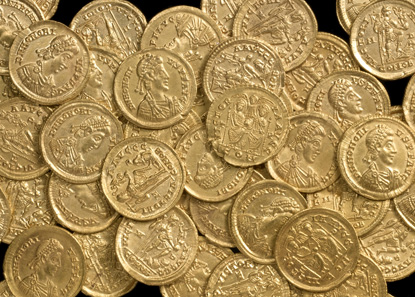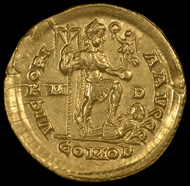December 6, 2012 – In the first days of October 2012 a metal detectorist found a hoard of Roman gold coins in Hertfordshire. The coins were largely scattered on private land, maybe due to previous plough work. Subsequently a team of archeologists of St Albans City & District Council’s Museums’ Service came upon 159 coins, all of them made of gold. Although there have been larger hoards of Roman coins in the UK before, none of them consisted of so many gold coins. Generally these hoards comprised only single specimen of gold if they contained any at all.
55 of the coins from the hoard, most of them were minted in the Western Empire in the late fourth century. © St Albans Museums Service.
As a fact, this hoard ranges among the largest gold coin hoards ever found in the UK.
David Thorold, prehistory to medieval curator at Verulamium Museum, St Albans explained: ‘Threat of war or raids might lead to burial in the latter case, as may the prospect of a long journey, or any other risky activity. Gold solidi were extremely valuable coins and were not traded or exchanged on a regular basis. They would have been used for large transactions such as buying land or goods by the shipload. Typically, the wealthy Roman elite, merchants or soldiers receiving bulk pay were the recipients.’
One of the solidi issued for Arcadius from the western mint of Milan. (c) St Albans Museums Service.
Most of the coins are from the emperors Arcadius and Honorius and were minted in western mints like Milan and Trier. The coins of the hoard hence date back to the late fourth century CE and thus in fact from the end of Roman dominion over Britain since around 408 CE the Roman soldiers left the island forever.
Now a panel will decide if the hoard is to be declared treasure. If so, the local museum will be offered the possibility to acquire the coins while the sum normally is to be shared equally between the finder and the landowner.
A detailed article on the finding is available here.
Further information may give in future the website of the museum of St Alban.






